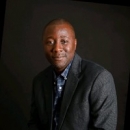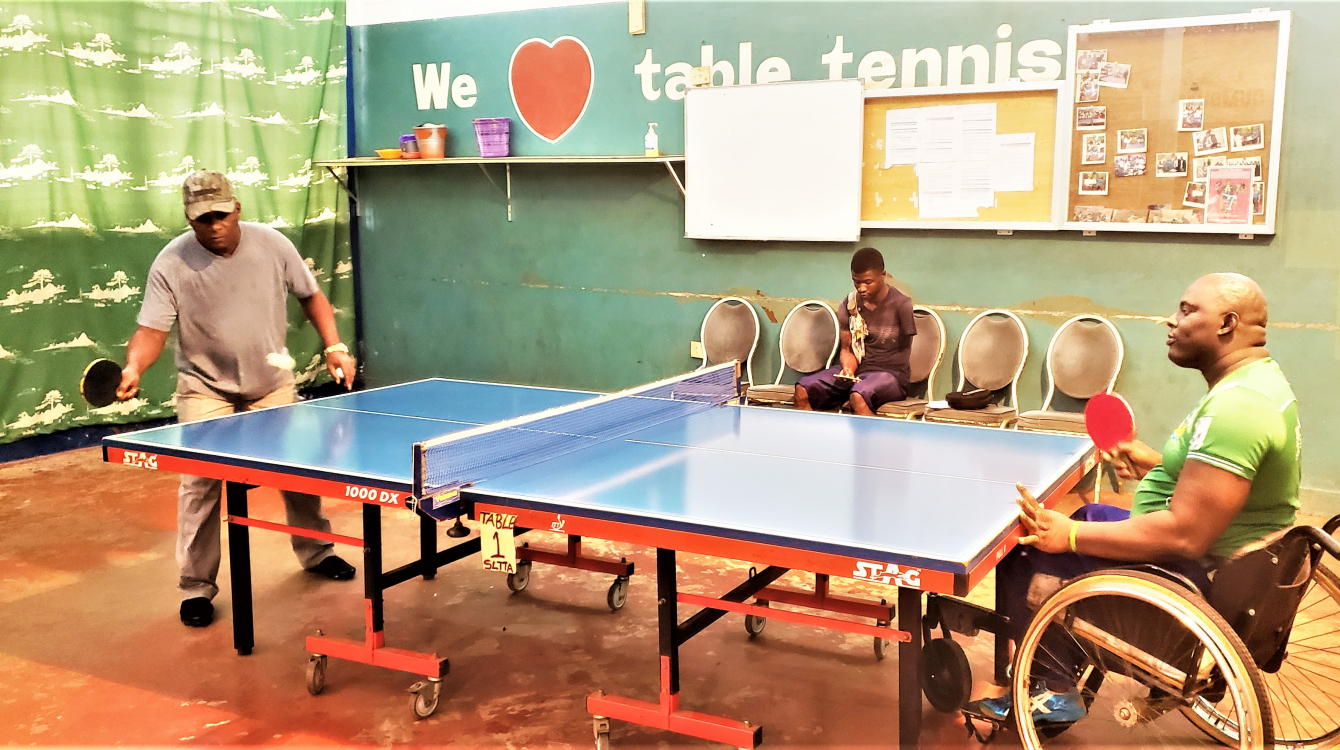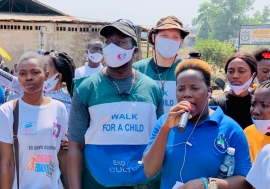Thirty-one-year-old George Wyndham, a Sierra Leonean Paralympian, will be competing in table tennis at the Tokyo Paralympics Games in August. He will be one of three Sierra Leonean Paralympians at the Games.
Postponed for a year due to the COVID-19 pandemic, the Tokyo 2020 Paralympic Games will take place during 24 August - 5 September 2021.
The pandemic has affected the preparation and participation of many athletes, including George.
“The COVID-19 pandemic adversely affected my training,” George tells Africa Renewal, in an interview. “I have spent the better part of last year without training. I could not even gain access to the gym as the stadium was closed.”
Nevertheless, George has set his sight on medals, "I have been training very hard these last few weeks. I am hoping to win medals."
Africa Renewal visited George’s training grounds at the Sierra Leone Table Tennis Association court in the capital, Freetown, on a rainy morning in early July, where his coach, John Bobson Taylor, was helping sharpen his reflexes.
"He is the man who made me what I am today," George said, as he introduced Mr. Taylor.
As George continued to relate his athletic journey, Mr. Taylor could be heard coaching in the background, barking out instructions on how to use the backhand, swing the underspin, the block and the cross-court more effectively.
While George continues to train at a frenetic pace, he still lacks basic equipment for the competition. "I have been using this old wheelchair for the past four years, and it is not good enough," he complains.
The tennis rackets (bats) also looked old and worn out. His smartphone device, which is a requirement for all Paralympians to access the app created for the event, is broken.
George is hopeful of a change of situation before the Games; yet his plight highlights the situation of many athletes who lack modern training facilities to enable them to be competitive in international sporting events.
“I expect a miracle,” George anticipates.
The Paralympian is living at the capital’s National Stadium Hostels in a one-room apartment, which he shares with two other athletes also living with disabilities.
Numerous certificates recognizing his exploits in international competitions decorate the walls of his living room. Medals are carefully arranged at one end of the wall while an enlarged photo of him and Sierra Leone’s president, Julius Maada Bio, hangs up at the other end.
The athlete boasts 17 medals, including the two bronze and one silver that he bagged at his first outing at the African Championship and Egypt Open in 2011.
Although not as celebrated as the country’s soccer players, in sheer number of medals, George is believed to be Sierra Leone’s best achiever in sports.
Born in 1990, a year before a bloody civil war started in Sierra Leone, George contracted polio before his sixth birthday.
To escape the war, his family fled Kenema in eastern Sierra Leone for the capital city where he was enrolled at the Freetown Cheshire Home, which supports persons living with disabilities.
It was a head-start that young George desperately needed. He was given a wheelchair before he started competing in track and field, handball, and other games. Realizing how good he was in these sports, he was determined to succeed.
“The small boy was going to school at the Government Model Secondary School when we spotted his talent," says his coach Mr. Taylor, explaining George’s athletic journey.
George was fortunate to be in school, given that school attendance for children with disabilities in Sierra Leone is lower—by seven per cent for boys and 10 per cent for girls—than for those without disabilities. According to government statistics, 46.5 per cent of people with disabilities had never been to school and 63.9 per cent are illiterate.
Mr. Taylor encouraged George to participate in the 800 metres wheelchair inter-secondary school sports competition and later in the annual Boxing Day championship.
Post-secondary school, George trained for 10 years without any opportunities coming his way until the Africa Championship and Egypt Open came in 2011, where he competed and won laurels in the table tennis men's singles and doubles.
After Egypt, he represented Sierra Leone in the Jordan Open, winning two medals. Because of his performance, he was a wild card, joining the African team for the World Championships in China in 2015. Unfortunately, he could not travel to China due to the Ebola outbreak that had hit Sierra Leone at the time.
George is a strong advocate for the rights of persons with disabilities in his country. "I am into advocacy for them. I also mentor and bring them into sporting activities, and discourage them from street begging," he says.
Persons with disabilities in the country continue to face a range of social exclusion. The Sierra Leone Multidimensional Poverty Index 2019 indicated that 68.1 per cent of adults with functional disabilities are poorer than those without functional disabilities.
The report was produced by Oxford Human Development Initiative in collaboration with Sierra Leone’s Ministry of Planning and Economic Development, Statistics Sierra Leone, and the UN Development Programme (UNDP).
Amid the COVID-19 pandemic, some persons with disabilities cannot access handwashing stations because of physical inaccessibility, have difficulty in social distancing and face barriers accessing public health information.
George was at the forefront advocating for the Sierra Leonean government to ratify the Convention on the Rights of Persons with Disabilities, which was signed in October 2010.
"That was a big success for me because I was the public relations person for Young Voices, a local non-governmental organisation that was actively involved in this effort,” he recalls.
Following the COVID-19 restrictions, including lockdowns, he joined a local NGO, One Family, to implement a community sensitisation effort that encouraged people to mask up and observe all COVID-19 public health and safety protocols. "I loved it," he says. UNDP in Sierra Leone supports that effort.
George hopes to return from Tokyo with glory for his motherland. While there competing, he says, he will continue to be inspired by his two-year-old daughter who, he vows, must acquire an excellent education.
“She will be my pillar tomorrow,” he says. “Therefore, today, I am prepared to make all the sacrifices for her. I am prepared to go to bed on an empty stomach just to save money to give her a good education.”














